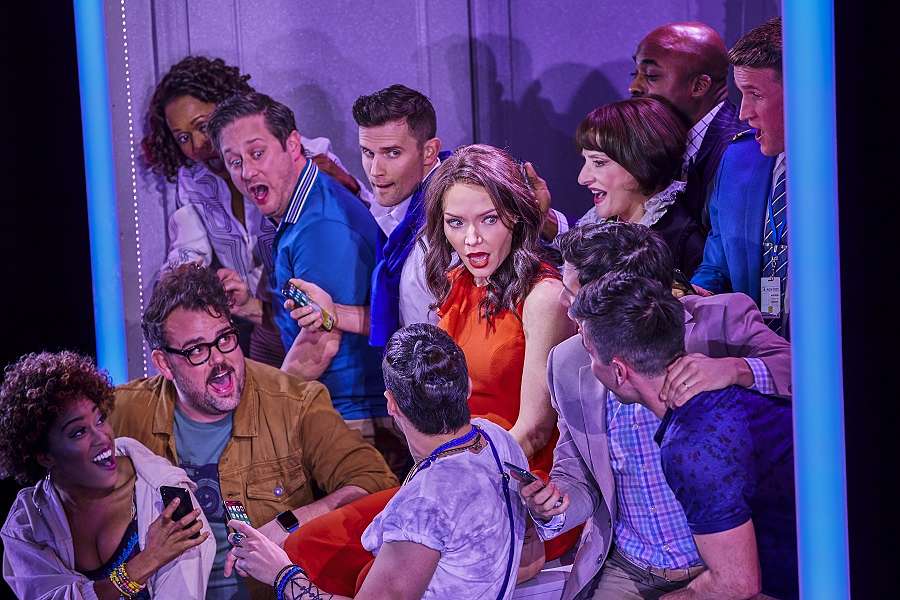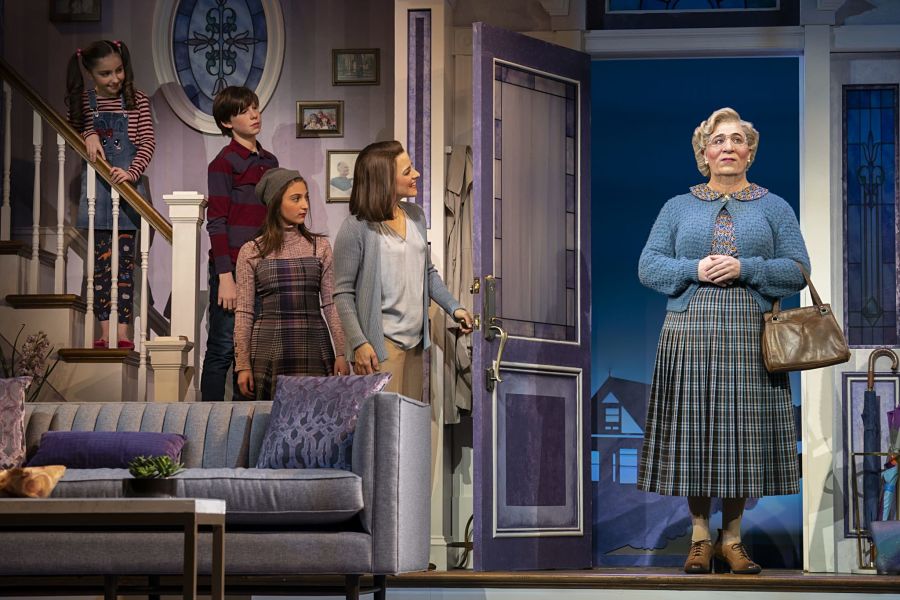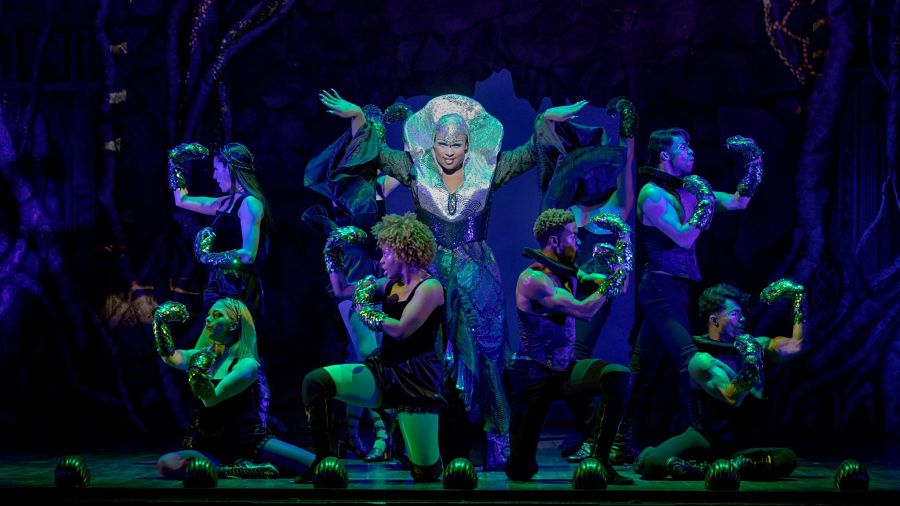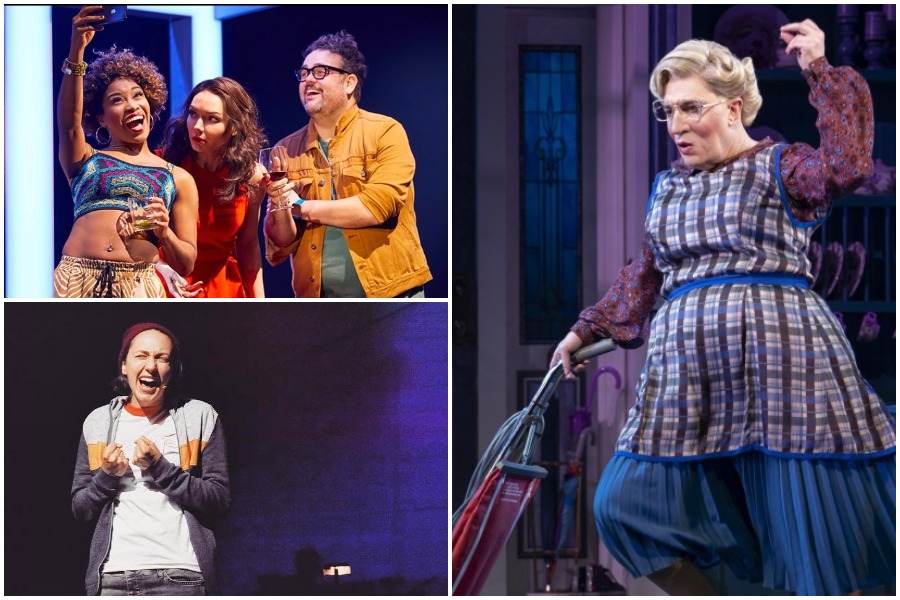Pre-pandemic, the last full Broadway season we had (2018-2019) began with Head Over Heels and ended with Tootsie. The former was a landmark musical for gender and sexual diversity, including lesbian leads, a character that does drag and explores his gender, and Broadway’s first explicitly nonbinary character, played by Peppermint, the first trans person to orginate a leading role on Broadway. In many ways Tootsie was its antithesis: a musical rooted entirely in transphobic man-in-a-dress jokes. In May of 2019, I wrote an essay for American Theatre, “The Gender Problem Tootsie Can’t Dress Up,” which became the site’s most read story of the year and sparked a lot of critical debate.
Now, a year and half later, I am here to follow up, to check in on the state of gender and sexuality in musical theatre on Broadway—and in particular to see if the industry has learned any lessons since Tootsie. Three currently running musicals on Broadway—Jagged Little Pill, Company, and Mrs. Doubtfire—offer a chance to explore how far Broadway has come in terms of gender and sexual politics. Sadly, the picture isn’t promising.
While for me Tootsie presented a pretty clear example of problematic content, the case is more complicated with Jagged Little Pill, which premiered on Broadway in late 2019. The character Jo, played by Lauren Patten, has a controversial history, both in terms of casting and writing (I wrote about this in depth in the Brooklyn Rail). In an early out-of-town production, Jo was written to come across as nonbinary; but when the show transferred to Broadway, these references were silently excised, in a painful example of erasure. What’s worse: The production, including Patten, who is cisgender, claimed that Jo had been cisgender all along.
Spurred by widespread public outcry, the production released a statement of apology, acknowledging the harm caused and promising to do better in the future, including hiring a dramaturgical consulting team and exploring having nonbinary actors play Jo. But Patten is still playing Jo. In an “accountability conversation” with Shakina Nayfack, Patten said she feels entitled to play the role and to finish what she started. She even received a Tony for her performance, as did Diablo Cody, who wrote the book which first floated, then erased Jo’s nonbinary gender. As with Tootsie, which got Tonys for Santino Fontana’s lead performance and Robert Horn’s book, the main gender problems with Jagged were the very elements recognized with awards.
(In tandem with these issues, JLP is the subject of offstage controversy, as two former nonbinary cast members, Iris Menas and Nora Schell, released complaints about their treatment during the production. The latter’s complaint is being officially investigated.)
Patten has said that she decided to continue to play Jo to honor all the queer people who feel seen in the butch queer version of Jo she’s playing. That would be a fine motivation, but given her history with the show, I have my doubts. To me the implication is clear: Patten cares more about holding onto a Tony-winning role than about the pain she and the show have caused trans audience members.

This prioritization of sexuality over gender is reversed in the current revival of Company, which is notable for having a female Bobbie (played by Katrina Lenk). In this reinterpretation of the classic 1970 musical, Bobbie is a woman whose biological clock is ticking, so that being single at 35 is a higher-stakes experience than it would be for a man. But while director Marianne Elliott had the inspired idea of changing Bobby’s gender, she seems unable to think about Bobbie as anything but straight. The decision to make Bobbie unbendingly hetero, a choice deeply connected to the gender change here, creates more problems than it solves, and negatively impacts the production overall.
The issue of Bobby’s potentially queer sexuality has long haunted Company. Though Stephen Sondheim and George Furth would never fully endorse the idea that the reason Bobby isn’t yet married is that he is a closeted gay man, and would not condone John Tiffany’s all-gay-men workshop of Company, in a New York Times interview the week before his death, Sondheim did acknowledge that the play’s “girlfriend scenes” did work “really well” in a same-sex context. But Elliott clearly disagrees; now that Bobbie is a woman, all the girlfriends are boyfriends.
This is a shame. Any number of the original girlfriend characters—April, Marta, and Kathy, now renamed Andy, PJ, and Theo—could have remained women or been nonbinary, so that Bobbie could be queer, bi, closeted, or exploring her sexuality. In an interview Elliott said that she had tried PJ as a woman, “because PJ would be the one that would fit most,” but that it “didn’t work” because it “invited the audience to laugh” at the character, and presumably at the idea of Bobbie dating a woman, so the idea was cut. As Madison Malone Kircher wrote, “We almost got the queer Company of our dreams.” Almost.
It’s odd that Elliott would have chosen to try PJ, the new musical analogue for Marta (the one who sings “Another Hundred People”), as a woman. In the original, it’s Kathy who has a scene that almost begs for a queer interpretation; she’s the one who tells Bobby she has decided to go back to Cape Cod and marry her fiance; when Bobby asks her, “Do you love him?” she cannot answer, instead saying, “I’ll make a great wife.” Imagine this as a scene between Kathy and a female Bobbie, both of whom are bi but are perhaps closeted and feel pressure to be with men, and just think how tragic Kathy’s “I always knew I was meant to be a wife” could have been. (With a man in this role that line, and the scene, make little sense.)
There is so much queer potential in Company that Elliott either ignores, squashes, or bungles. The moment when Joanne sexually propositions Bobby has been altered in this version so that Joanne suggests the female Bobbie sleep with Larry, her husband. The scene in which Peter asked Bobby, “Did you ever have a homosexual experience?” has been cut entirely. In her quest to explore gender, Elliott goes out of her way to make Bobbie exclusively straight, and explicitly removes any potential for queerness, even altering the script to do so.
Elliott has also changed the genders of several of the couples, including Peter/Susan and David/Jenny, though for unclear reasons and with muddled results. In addition, while this production of Company has added a gay relationship, tranforming Amy and Paul into Jamie and Paul, the choice only raises more questions. In the scene after “Getting Married Today,” Elliott finds a resonance about same-sex marriage in Jamie’s line, “It is so crazy having this enormous wedding and everything after we’ve been living together all these years,” but ruins it by keeping the original ending, “People will think I’m pregnant,” which, coming from a gay man, is just a cringe-worthy joke. Though Elliott has made Jamie a male character, she has him join the women in “Have I Got a Guy for You,” while his partner Paul sings with the men in “Poor Baby”—functionally treating Jamie as one of the wives/women and Paul as one of the husbands/men. This displays a limited understanding of both gender and sexuality, and demonstrates that Elliott has little interest in exploring Jamie as a queer character.
Indeed, the very inspiration for the seemingly progressive choice of putting a gay wedding into Company is not so rosy: Back in 2018, when the production was in the West End, Elliott told the New York Times in an interview that she chose to change Amy to Jamie after a workshop in which the female Bobbie proposed to the female Amy. Elliott referred to this as a moment of “Whooo—I’m not sure I fully believe this”—a strikingly biphobic comment. It’s especially revealing that Elliott somehow found a female Bobbie proposing to Amy unbelievable, but has no issue with a female Bobbie proposing to Jamie, a gay man.
Just think of how topical and complex a genuinely queer Company could be in 2021, when the preponderance of same-sex marriage has totally changed the dating landscape for queer people. We may have a newfound desire, and option—as straight people have had for centuries—to marry. Or not! A queer Company could have been a compelling vehicle to explore this new context.

While both Jagged Little Pill and Company struggle in their own ways to explore both gender and sexuality in nuanced ways, the bigger problem of the season is Mrs. Doubtfire, another nostalgic adaptation of a man-in-a-dress film comedy. In theory, Mrs. Doubtfire had the time and chance to learn from Tootsie’s mistakes. The writers even had the entire pandemic to rethink, adjust, do some research, and perhaps begin to actually listen to the trans people critiquing it. They did not. For a supposedly family-friendly show about love, it spreads some dangerously transphobic messages.
On the surface, Mrs. Doubtfire shares many of Tootsie’s problems, notably the transphobic trope of the man-in-a-dress joke. Here the writers attempt to skirt the issue by emphasizing that the central character, Daniel Hillard (Rob McClure), is an actor and does funny voices and characters; Mrs. Doubtfire is just one of these. Like Tootsie, though, Mrs. Doubtfire seems unaware that not all characters or jokes are created equal, and that man-in-a-dress jokes in particular are inherently problematic and rooted in transmisogyny. In my Tootsie essay I talked about that musical’s problematic depiction of drag; but while the creators of Mrs. Doubtfire attempt to address the concept of drag, they have actually made things worse. In the scene where Daniel is first put into Mrs. Doubtfire drag (by his tokenized, steroetyped, and flamboyant gay brother and brother-in-law), he explictly states that he is not doing drag. But if he’s not doing drag, then what is he doing?
Just like Tootsie, the show has sidekicks who call out Daniel, unsurprisingly the only queer characters:
DANIEL: Can you help me?
ANDRE: No! Uh uh! It’s wrong.
FRANK: How can you say that? If he wants to be a woman he has every right to be!
ANDRE: That’s not what he’s talking about. He’s talking about putting on a disguise to deceive his ex-wife.
FRANK: Oh. That is wrong.
Even though they point out that wrongness, Frank and Andre still put him in drag in a large, deeply sexist disco number in which ensemble members enter dressed as various inspirations for the Doubtfire drag. First female ensemble members dance in beautiful dresses as Donna Summer, Princess Diana, Cher, Jackie O., and Grace Kelly, and then male ensemble members enter in frumpy skirt-suits as Janet Reno, Julia Child, Margaret Thatcher, and Eleanor Roosevelt. The misogynist message: These “ugly” (and often politically important) women are the equivalent of men in drag, and are something to be laughed at.
Mrs. Doubtfire does avoid some of the more problematic moments of the film, including the moment when one of the children catches Daniel, in Mrs. Doubtfire drag, peeing standing up. But for every slight improvement, there are more missteps. Mrs. Doubtfire, unlike Tootsie, avoids genital humor, but has a dance number at the top of Act Two where Daniel has to wear a bikini as Mrs. Doubtfire. The joke is obviously supposed to be about the logistical difficulties of tucking himself in, as the song is titled “The Shape of Things to Come” (eye roll).
Throughout the musical, the rapid getting into and out of Doubtfire drag is played for laughs. There are two extended sequences of this, one in each act, and in both Daniel’s transformations are in full view, with the audience clearly meant to marvel and laugh at the process, especially the full-figured nude body suit he wears, complete with hip, stomach, and breast padding. In a particularly horrifying climactic scene at the restaurant, Daniel, as Mrs. Doubtfire, is dancing with the waiters when somehow his disguise falls off, leaving him in the middle of the restaurant wearing only the nude bodysuit meant to mimic the body of a plus-size woman. Once again, this is played for laughs.
I found the experience of watching Mrs. Doubtfire difficult and upsetting, not least because the audience around me seemed to love it, uncritically cheering and clapping as the musical replicated each famous moment from the film (the pie on the face, the vacuuming dance, the scorched fake breasts). Perhaps most painful was the fact that the audience was enthusiastically laughing at each and every man-in-a-dress joke. While critics seemed to have learned a bit since Tootsie (several mentioned transphobia and/or gender issues in their reviews of Mrs. Doubtfire), it appears that the writers, Kasey Kirkpatrick, Wayne Kirkpatrick, and John O’Farrell, are happy to pander to the same transphobic attitudes as Tootsie did. Sitting in the audience, it felt as if nothing had changed. It might as well have been called Tootsie 2: Transphobia Reloaded.
While watching Mrs. Doubtfire I had a simple idea: If it is supposed to be about a father who is an actor and wears a disguise to be with his kids, why does it have to be Mrs. Doubtfire? Why can’t he just be an elderly male Scottish nanny? It would not change the plot at all; it would just remove the transphobic man-in-a-dress joke at the center of this whole enterprise. Ironically, a lot of the marketing for the show simply uses the title Doubtfire, as if the PR team is trying to stay away from the gendered part of the title and all that it goes with it.

As Mrs. Doubtfire, Company, and Jagged Little Pill illustrate, the state of gender and sexuality on Broadway isn’t great, and sadly the future does not look bright. Announced for next year is a musical adaptation of the film Some Like It Hot, yet another man-in-a-dress comedy. This raises the question: Can there ever be a non-problematic, non-transphobic man-in-a-dress musical? As I said in my Tootsie essay, drag is not inherently transphobic—in fact, it is a very important way to explore gender that can be comedic, dramatic, and political. But if a show is rooted in drag that is only man-in-a-dress jokes, it will always be transphobic. There are certainly other ways to explore drag and gender positively onstage; we’ve seen some in La Cage aux Folles, Kinky Boots, Rent, Priscilla Queen of the Desert, and Head Over Heels; we just have to get beyond man-in-a-dress humor. Indeed, we need to leave it behind completely if we are to explore gender onstage in ways that are nuanced and meaningful.
In short, as I look at this season’s offerings, I am disheartened. Broadway is still struggling to explore both gender and sexuality, to provide nonbinary and trans representation (in characters, in casting, and on production teams), to let canonical characters be interpreted in queer ways, and to represent drag in ways that are not merely man-in-a-dress transphobic jokes.
I remain ever hopeful. But it is on us to make this change. Writers, directors, casting agents: Do better, write better. Do your research and listen to and cast queer and trans people. Audiences and critics: Don’t give problematic, transphobic, or homophobic shows your money, your praise, or your awards. I know there are more shows out there like Head Over Heels just waiting to be written or waiting to get to Broadway. When they come, buy a ticket and support them. Let them run forever. Let’s make Broadway a place that we can be proud of.
Christian Lewis (they/them) is a queer nonbinary freelance theatre critic with bylines in Did They Like It?, BroadwayWorld, Theatermania, Theatrely, The Brooklyn Rail, Out, and others. They co-host the podcast What’s Up Broadway? They are also a Ph.D. candidate at the CUNY Graduate Center. @clewisreviews


